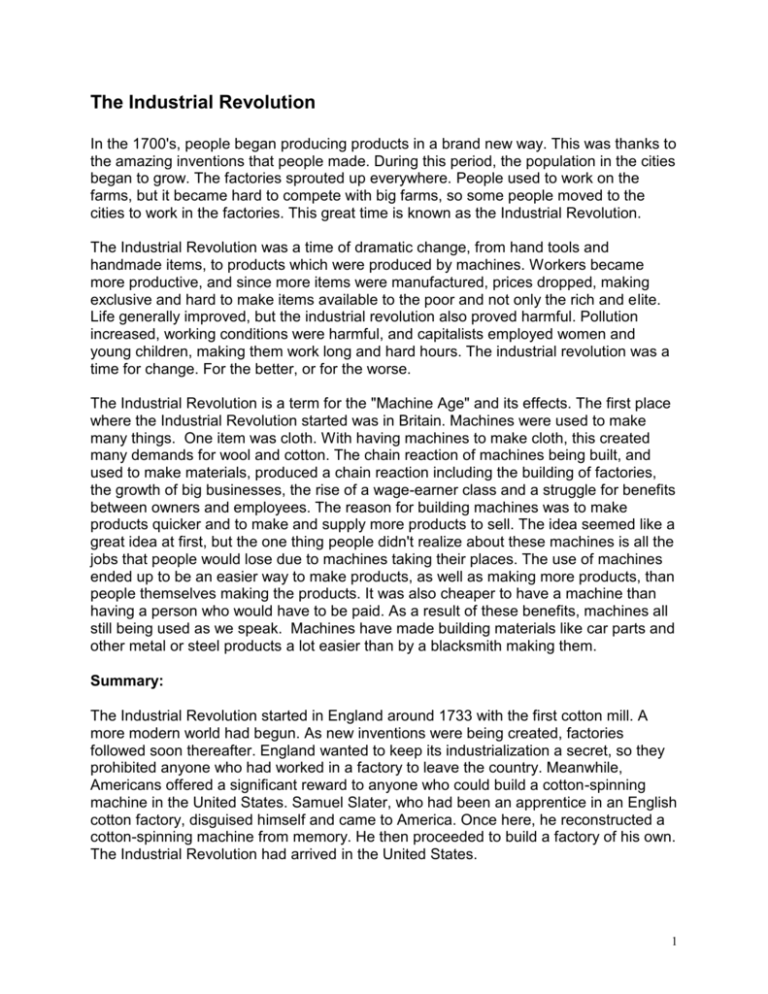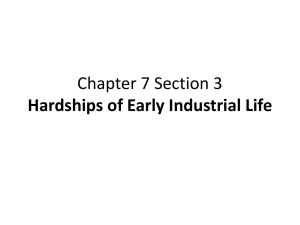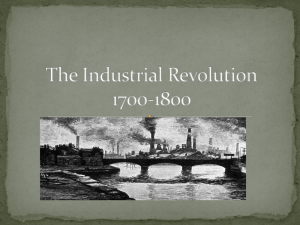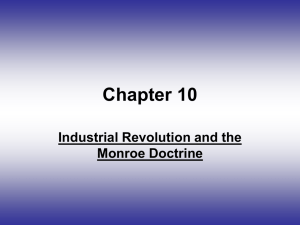The Industrial Revolution
advertisement

The Industrial Revolution In the 1700's, people began producing products in a brand new way. This was thanks to the amazing inventions that people made. During this period, the population in the cities began to grow. The factories sprouted up everywhere. People used to work on the farms, but it became hard to compete with big farms, so some people moved to the cities to work in the factories. This great time is known as the Industrial Revolution. The Industrial Revolution was a time of dramatic change, from hand tools and handmade items, to products which were produced by machines. Workers became more productive, and since more items were manufactured, prices dropped, making exclusive and hard to make items available to the poor and not only the rich and elite. Life generally improved, but the industrial revolution also proved harmful. Pollution increased, working conditions were harmful, and capitalists employed women and young children, making them work long and hard hours. The industrial revolution was a time for change. For the better, or for the worse. The Industrial Revolution is a term for the "Machine Age" and its effects. The first place where the Industrial Revolution started was in Britain. Machines were used to make many things. One item was cloth. With having machines to make cloth, this created many demands for wool and cotton. The chain reaction of machines being built, and used to make materials, produced a chain reaction including the building of factories, the growth of big businesses, the rise of a wage-earner class and a struggle for benefits between owners and employees. The reason for building machines was to make products quicker and to make and supply more products to sell. The idea seemed like a great idea at first, but the one thing people didn't realize about these machines is all the jobs that people would lose due to machines taking their places. The use of machines ended up to be an easier way to make products, as well as making more products, than people themselves making the products. It was also cheaper to have a machine than having a person who would have to be paid. As a result of these benefits, machines all still being used as we speak. Machines have made building materials like car parts and other metal or steel products a lot easier than by a blacksmith making them. Summary: The Industrial Revolution started in England around 1733 with the first cotton mill. A more modern world had begun. As new inventions were being created, factories followed soon thereafter. England wanted to keep its industrialization a secret, so they prohibited anyone who had worked in a factory to leave the country. Meanwhile, Americans offered a significant reward to anyone who could build a cotton-spinning machine in the United States. Samuel Slater, who had been an apprentice in an English cotton factory, disguised himself and came to America. Once here, he reconstructed a cotton-spinning machine from memory. He then proceeded to build a factory of his own. The Industrial Revolution had arrived in the United States. 1 The Industrial Revolution brought severe consequences to society. Factory owners, needing cheap, unskilled labor, profited greatly by using children and women to run the machines. By the age of 6, many children were already working 14 hours a day in factories! These kids had no free time to do anything else and earned Iow wages. Some got sick and died because of the toxic fumes, while others were severely injured and sometimes killed working at the dangerous machines in factories. Obviously, the Industrial Revolution had both good and bad sides. Eli Whitney and the Cotton Gin Eli Whitney attended Yale College in 1789 at age 23, and in 1793, he invented the cotton gin. This machine played a large role in the Industrial Revolution. Unfortunately, when it was invented, nobody, not even Whitney himself, realized that the cotton gin would revitalize slavery. Whitney's invention helped the cotton industry just when the South was suffering economic problems. The cotton gin (short for cotton engine) was a machine for getting seeds out of cotton. Where before the seeds had to be picked by hand, slaves used the machines to significantly increase production. Later, Whitney became quite famous for building muskets with interchangeable parts. These were the easiest and fastest guns to make. They became very popular due to their lower cost. There were good and bad things about these guns. Because they were easier to make, large quantities could be produced in a short period of time. This factor became important during the American Civil War. The quality of the guns, though, were not as good as those which were hand made. Choosing between quality and quantity, factory owners chose quantity. Whitney's interchangeable muskets became almost as popular as his cotton gin. Robert Fulton & The Steam Engine Robert Fulton was a famous inventor and engineer. During the 1780s, he became the first American to build a steam-powered engine. This engine was used to power steamboats all over the United States. He built a paddle steamboat, the Clermont, that traveled from New York to Albany on the Hudson River. The steam engine was a great invention because it was important to the transportation industry. With steamboats traveling all of the United States' major rivers, they became the fastest way of transportation for Americans. Francis Cabot Lowell & The American Textile Industry Francis Cabot Lowell was a textile manufacturer in the U.S. in the early 1800s. He founded a mill that went through the entire process of manufacturing cotton. He built the Lowell Mills based on the British cotton mills, after taking a trip to England and seeing a British cloth factory. He took home his ideas from the British factories and built his own mills for spinning and weaving. His mills became famous. This was just another piece of the American part in the Industrial Revolution. 2 Conclusion In conclusion, the Industrial Revolution was an outburst of new inventions in the U.S. and in other parts of the world. Many inventions from this period are still used today. There were other minor inventions, such as: the sewing machine (invented by Elias Howe), the steel plow (invented by John Deere), the reaper (invented by Cyrus McCormick), and vulcanized rubber (invented by Charles Goodyear), for which our lives today are much richer. Overall, the Industrial Revolution greatly transformed the U.S. economy and society. Its impact will never be forgotten by workers in the textile industry and many other industries. Descriptions from Victorian England The Physical Deterioration [P. Gaskell, The Manufacturing Population of England. London, 1833, pp.161-162, 202-203.] (Some parts have been reworded for easier comprehension in 20th century America.) Any man who has stood at twelve o'clock at the single narrow door-way, which serves as the place of exit for the hands employed in the great cotton-mills, must acknowledge, that an uglier set of men, women, boys and girls; taking them in the mass; would be impossible to congregate in a smaller compass. Their complexion is sallow and pallid-with a peculiar flatness of feature, caused by the want of a proper quantity of adipose substance to cushion out the cheeks. Their stature Iow--the average height of four hundred men, measured at different times, and different places, being five feet six inches. Their limbs are slender, and move badly and ungracefully. A very general bowing of the legs. Great numbers of girls and women walk lamely or awkwardly, with raised chests and spinal flexures. Nearly all have fiat feet, accompanied with a downtread, differing very widely from the elasticity of action in the foot and ankle, attendant upon perfect formation. Hair thin and straight--many of the men having but little beard, and that in patches of a few hairs, much resembling its growth among the red men of America. A spiritless and dejected air, a sprawling and wide action of the legs, and an appearance, taken as a whole, giving the world but "little assurance of a man," or if so, "most sadly cheated of his fair proportions..." Factory labour is a species of work, in some respects, singularly unfitted for children. Cooped up in a heated atmosphere, debarred the necessary exercise, remaining in one position for a series of hours, one set or system of muscles alone called into activity, it cannot be wondered at-that its effects are injurious to the physical growth of a child. Where the bony system is still imperfect, the vertical position it is compelled to retain, influences its direction; the spinal column bends beneath the weight of the head, bulges out laterally, or is dragged forward by the weight of the parts composing the chest, the pelvis yields beneath the opposing pressure downwards, and the resistance given by the thigh-bones; its capacity is lessened, sometimes more and sometimes less; the legs curve, and the whole body loses height, in consequence of this general yielding and bending of its parts. 3 John Fielden, although himself a Lancashire factory owner, was one of the staunchest fighters for protective legislation for the cotton worker. His difficulties and concerns are such as those commonly found today in the Southern states of the United States. A Cotton Manufacturer on Hours of Labor [John Fielden, M.P., The Curse of the Factory System. London, 1836,pp. 34-35.] Here, then, is the "curse" of our factory-system; as improvements in machinery have gone on, the "avarice of masters" has prompted many to exact more labour from their hands than they were fitted by nature to perform, and those who have wished for the hours of labour to be less for all ages than the legislature would even yet sanction, have had no alternative but to conform more or less to the prevailing practice, or abandon the trade altogether. This has been the case with regard to myself and my partners. We have never worked more than seventy-one hours a week before Sir John Hobhouse’s Act was passed. We then came down to sixty-nine; and since Lord Althorp's Act was passed, in 1833, we have reduced the time of adults to sixty-seven and a half hours a week, and that of children under thirteen years of age to forty-eight hours in the week, though to do this latter has, I must admit, subjected us to much inconvenience, but the elder hands to more, inasmuch as the relief given to the child is in some measure imposed on the adult. But the overworking does not apply to children only; the adults are also overworked. The increased speed given to machinery within the last thirty years, has, in very many instances, doubled the labour of both. Sending boys up chimneys to clean them was a common practice, and a dangerous and cruel one. Lord Ashley became the chief advocate of the use of chimney-sweeping machinery and of legislation to require its use. Even earlier, however, such a law had been proposed, but it met with strong opposition. In a debate on this subject in the House of Lords in 1819, the Earl of Lauderdale well represented a large body of conservative opinion. Opposition to the Chimney Sweepers' Regulation Bill [Hansard's Parliamentary Debates, March 8, 1819. New Series, vol. 39, p. 901.] Their lordships had lately heard complaints of the encouragement given to machinery, in preference to manual industry. Now, though he differed most completely from those who cherished the prejudice he alluded to--though he was convinced that the introduction of machinery had not only had the effect of enriching the proprietor, but also of enabling the workman to live better and cheaper than he otherwise could have done--yet there certainly was some difference to be drawn between their encouraging and enforcing the adoption of machinery, and especially when those persons who best understood its application in the way of trade were against its introduction at all. ...If their lordships were determined to adopt such a course, they must introduce a code of moral legislation unknown to their ancestors, and quite unsuited to their habits and laws. The better way, in his judgment, would be to leave reforms of this kind entirely to the moral feeling of, perhaps, the most moral people, on the whole face of the earth. 4 When Sadler was defeated for reelection in 1833 by Macaulay, his successor as leader in the campaign for shorter hours was Lord Ashley, later Earl of Shaftesbury, whose achievements in this field exceeded any other man's. More than a generation later the old Earl of Shaftesbury, speaking for a bill to relieve conditions of textile workers in India, commented on the great gains brought about by similar legislation in England. The Benefit of the Factory Legislation [Hansard's Parliamentary Debates. Apr. 4, 1879.3rd Series, vol. CCXLV, pp. 355-356.] The other is the old, the often-repeated, and as often-refuted, argument that the work is light. Light! Why, no doubt, much of it is light, if measured by the endurance of some three or four minutes. But what say you, my Lords, to a continuity of toil, in a standing posture, in a poisonous atmosphere, during 13 hours, with 15 minutes of rest? Why, the stoutest man in England, were he made, in such a condition of things, to do nothing during the whole of that time but be erect on his feet and stick pins in a pincushion, would sink under the burden. What say you, then, of children--children of the tenderest years? Why, they become stunted, crippled, deformed, useless. I speak what I know--I state what I have seen. When I visited Bradford, in Yorkshire, in 1838, being desirous to see the condition of the children--for I knew that they were employed at very early ages in the worsted business .... I asked for a collection of cripples and deformities. In a short time more than 80 were gathered in a large courtyard. They were mere samples of the entire mass. I assert without exaggeration that no power of language could describe the varieties, and I may say, the cruelties, in all these degradations of the human form. They stood or squatted before me in all the shapes of the letters of the alphabet. This was the effect of prolonged toil on the tender frames of children at early ages. When I visited Bradford, under the limitation of hours some years afterwards, I called for a similar exhibition of cripples; but, God be praised! there was not one to be found in that vast city. Yet the work of these poor sufferers had been light, if measured by minutes, but terrific when measured by hours. The second of the three great reports embodies the results of the investigation into the conditions of labor in the mines made by Lord Ashley's Mines Commission of 1842. The Mines Act of 1842 that resulted, prohibited the employment in the mines of all women and of boys under thirteen. Testimony Gathered by Ashley's Mines Commission [Parliamentary Papers, 1842, vols. XV-XVII, Appendix I, pp. 252, 258, 439, 461; Appendix II, pp. 107, 122, 205.] No. 116.--Sarah Gooder, aged 8 years. I'm a trapper in the Gawber pit. It does not tire me, but I have to trap without a light and I'm scared. I go at four and sometimes half past three in the morning, and come out at five and half past. I never go to sleep. Sometimes I sing when rve light, but not in the dark; I dare not sing then. I don't like being in the pit. I am very sleepy when I go sometimes in the morning. I go to Sunday-schools and read Reading made Easy. She 5 knows her letters, and can read little words. They teach me to pray. She repeated the Lord's Prayer, not very perfectly, and ran on with the following addition:--"God bless my father and mother, and sister and brother, uncles and aunts and cousins, and everybody else, and God bless me and make me a good servant. Amen." I have heard tell of Jesus many a time. I don't know why he came on earth, rm sure, and I don't know why he died, but he had stones for his head to rest on. I would like to be at school far better than in the pit. No. 137.--Thomas Wilson, Esq., of the Banks, Silkstone, owner of three collieries. ...The employment of females of any age in and about the mines is most objectionable, and I should rejoice to see it put an end to; but in the present feeling of the colliers, no individual would succeed in stopping it in a neighborhood where it prevailed, because the men would immediately go to those pits where their daughters would be employed. The only way effectually to put an end to this and other evils in the present colliery system is to elevate the minds of the men; and the only means to attain this is to combine sound moral and religious training and industrial habits with a system of intellectual culture much more perfect than can at present be obtained by them. I object on general principles to government interference in the conduct of any trade, and I am satisfied that in mines it would be productive of the greatest injury and injustice. The art of mining is not so perfectly understood as to admit of the way in which a colliery shall be conducted being dictated by any person, however experienced, with such certainty as would warrant an interference with the management of private business. I should also most decidedly object to placing collieries under the present provisions of the Factory Act with respect to the education of children employed therein. First, because, if it is contended that coal-owners, as employers of children, are bound to attend to their education, this obligation extends equally to all other employers, and therefore it is unjust to single out one class only; secondly, because, if the legislature asserts a right to interfere to secure education, it is bound to make that interference general; and thirdly, because the mining population is in this neighborhood so intermixed with other classes, and is in such small bodies in any one place, that it would be impossible to provide separate schools for them. No. 14--Isabella Read, 12 years old, coal-bearer. Works on mother's account, as father has been dead two years. Mother bides at home, she is troubled with bad breath, and is very weak in her body from early labour. I am wrought with sister and brother, it is very sore work; cannot say how many rakes or journeys I make from pit's bottom to wall face and back, thinks about 30 or 25 on the average; the distance varies from 100 to 250 fathom. I carry about 1 cwt. and a quarter on my back; have to stoop much and creep through water, which is frequently up to the calves of my legs. When first down fell frequently asleep while waiting for coal from heat and fatigue. 6 I do not like the work, nor do the lassies, but they are made to like it. When the weather is warm there is difficulty in breathing, and frequently the lights go out. No. 134.--Isabel Wilson, 38 years old, coal putter. When women have children thick (fast) they are compelled to take them down early. I have been married 19 years and have had 10 bairns; seven are in life. When on Sir John's work was a carrier of coals, which caused me to miscarry five times from the strains, and was gai ill after each. Putting is no so oppressive; last child was born on Saturday morning, and I was at work on the Friday night. Once met with an accident; a coal brake my cheek-bone, which kept me idle some weeks. I have wrought below 30 years, and so has the good man; he is getting touched in the breath now. None of the children read, as the work is no regular. I did read once, but no able to attend to it now; when I go below lassie 10 years of age keeps house and makes the broth or stir-about. Nine sleep in two bedsteads; there did not appear to be any beds, and the whole of the other furniture consisted of two chairs, three stools, a table, a kail-ot and a few broken basins and cups. Upon asking if the furniture was all they had, the good wife said, furniture was of no use, as it was so troublesome to flit with. No. 26.--Patience Kershaw, aged 17, May 15. My father has been dead about a year; my mother is living and has ten children, five lads and five lasses; the oldest is about thirty, the youngest is four; three lasses go to mill; all the lads are colliers, two getters and three hurriers; one lives at home and does nothing; mother does naught but look after home. All my sisters have been hurriers, but three went to the mill. Alice went because her legs swelled from hurrying in cold water when she was hot. I never went to day-school; I go to Sunday-school, but I cannot read or write; I go to pit at five o'clock in the morning and come out at five in the evening; I get my breakfast of porridge and milk first; I take my dinner with me, a cake, and eat it as I go; I do not stop or rest any time for the purpose; I get nothing else until I get home, and then have potatoes and meat, not every day meat. I hurry in the clothes I have now got on, trousers and ragged jacket; the bald place upon my head is made by thrusting the corves; my legs have never swelled, but sisters' did when they went to mill; I hurry the corves a mile and more under ground and back; they weigh 300 cwt.; I hurry 11 a-day; I wear a belt and chain at the workings, to get the corves out; the getters that I work for are naked except their caps; they pull off all their clothes; I see them at work when I go up; sometimes they beat me, ill am not quick enough, with their hands; they strike me upon my back; the boys take liberties with me sometimes they pull me about; I am the only girl in the 7 pit; there are about 20 boys and 15 men; all the men are naked; I would rather work in mill than in coal-pit. This girl is an ignorant, filthy, ragged, and deplorable-looking object, and such an one as the uncivilized natives of the prairies would be shocked to look upon. No. 72--Mary Barrett, aged 14. June 15. I have worked down in pit five years; father is working in next pit; I have 12 brothers and sisters--all of them but one live at home; they weave, and wind, and hurry, and one is a counter, one of them can read, none of the rest can, or write; they never went to dayschool, but three of them go to Sunday-school; I hurry for my brother John, and come down at seven o'clock about; I go up at six, sometimes seven; I do not like working in pit, but I am obliged to get a living; I work always without stockings, or shoes, or trousers; I wear nothing but my chemise; I have to go up to the headings with the men; they are all naked there; I am got well used to that, and don't care now much about it; I was afraid at first, and did not like it; they never behave rudely to me; I cannot read or write. No. 7--Benjamin Miller, Underlooker at Mr. Woolley's, near Staley Bridge, April 14, 1841. How do you account for women being used so frequently as drawers in the coal-pits? -One reason is, that a girl of 20 will work for 2s. a-day or less, and a man of that age would want 3s. 6d.: It makes little difference to the coal-master, he pays the same whoever does the work; some would say he got his coal cheaper, but I am not of that opinion, the only difference is that the collier can spend ls. to ls. 6d. more at the alehouse, and very often the woman helps him to spend it. Do women ever become coal-getters? --Not one woman in a hundred ever becomes a coal-getter, and that is one of the reasons the men prefer them. Edwin Chadwick (1803-1890) had taken an active part in the reform of the Poor Law and in factory legislation before he became secretary to a commission investigating sanitary conditions and means of improving them. The Commission's report, of which the summary is given below, is the third of the great reports of this epoch. Chadwick's Report on Sanitary Conditions [Report...from the Poor Law Commissioners on an Inquiry into the Sanitary Conditions of the Labouring Population of Great Britain. London, 1842, pp. 369-372.] After as careful an examination of the evidence collected as I have been enabled to make, I beg leave to recapitulate the chief conclusions which that evidence appears to me to establish. 8 First, as to the extent and operation of the evils which are the subject of this inquiry:-That the various forms of epidemic, endemic, and other disease caused, or aggravated, or propagated chiefly amongst the labouring classes by atmospheric impurities produced by decomposing animal and vegetable substances, by damp and filth, and close and overcrowded dwellings prevail amongst the population in every part of the kingdom, whether dwelling in separate houses, in rural villages, in small towns, in the larger towns--as they have been found to prevail in the lowest districts of the metropolis. That such disease, wherever its attacks are frequent, is always found in connection with the physical circumstances above specified, and that where those circumstances are removed by drainage, proper cleansing, better ventilation, and other means of diminishing atmospheric impurity, the frequency and intensity of such disease is abated; and where the removal of the noxious agencies appears to be complete, such disease almost entirely disappears. That high prosperity in respect to employment and wages, and various and abundant food, have afforded to the labouring classes no exemptions from attacks of epidemic disease, which have been as frequent and as fatal in periods of commercial and manufacturing prosperity as in any others. That the formation of all habits of cleanliness is obstructed by defective supplies of water. That the annual loss of life from filth and bad ventilation are greater than the loss from death or wounds in any wars in which the country has been engaged in modern times. That of the 43,000 cases of widowhood, and 112,000 cases of destitute orphanage relieved from the poor's rates in England and Wales alone, it appears that the greatest proportion of deaths of the heads of families occurred from the above specified and other removable causes; that their ages were under 45 years; that is to say, 13 years below the natural probabilities of life as shown by the experience of the whole population of Sweden. That the public loss from the premature deaths of the heads of families is greater than can be represented by any enumeration of the pecuniary burdens consequent upon their sickness and death. That, measuring the loss of working ability amongst large classes by the instances of gain, even from incomplete arrangements for the removal of noxious influences from places of work or from abodes, that this loss cannot be less than eight or ten years. That the ravages of epidemics and other diseases do not diminish but tend to increase the pressure of population. 9 That in the districts where the mortality is greatest the births are not only sufficient to replace the numbers removed by death, but to add to the population. That the younger population, bred up under noxious physical agencies, is inferior in physical organization and general health to a population preserved from the presence of such agencies. That the population so exposed is less susceptible of moral influences, and the effects of education are more transient than with a healthy population. That these adverse circumstances tend to produce an adult population short-lived, improvident, reckless, and intemperate, and with habitual avidity for sensual gratifications. That these habits lead to the abandonment of all the conveniences and decencies of life, and especially lead to the overcrowding of their homes, which is destructive to the morality as well as the health of large classes of both sexes. That defective town cleansing fosters habits of the most abject degradation and tends to the demoralization of large numbers of human beings, who subsist by means of what they find amidst the noxious filth accumulated in neglected streets and bye-places. That the expenses of local public works are in general unequally and unfairly assessed, oppressively and uneconomically collected, by separate collections, wastefully expended in separate and inefficient operations by unskilled and practically irresponsible officers. That the existing law for the protection of the public health and the constitutional machinery for reclaiming its execution, such as the Courts Leer, have fallen into destitude, and are in the state indicated by the prevalence of the evils they were intended to prevent. Secondly, as to the means by which the present sanitary condition of the labouring classes may be improved:-The primary and most important measures, and at the same time the most practicable, and within the recognized province of public administration, are drainage, the removal of all refuse of habitations, streets, and roads, and the improvement of the supplies of water. That the chief obstacles to the immediate removal of decomposing refuse of towns and habitations have been the expense and annoyance of the hand labour and cartage requisite for the purpose. 10 That this expense may be reduced to one-twentieth or to one-thirtieth, or rendered inconsiderable, by the use of water and self-acting means of removal by improved and cheaper sewers and drains. That refuse when thus held in suspension in water may be most cheaply and innocuously conveyed to any distance out of towns, and also in the best form for productive use, and that the loss and injury by the pollution of natural streams may be avoided. That for all these purposes, as well as for domestic use, better supplies of water are absolutely necessary. That for successful and economical drainage the adoption of geological areas as the basis of operations is requisite. That appropriate scientific arrangements for public drainage would afford important facilities for private land-drainage, which is important for the health as well as sustenance of the labouring classes. That the expense of public drainage, of supplies of water laid on in houses, and of means of improved cleansing would be a pecuniary gain, by diminishing the existing charges attendant on sickness and premature mortality. That for the protection of the labouring classes and of the ratepayers against inefficiency and waste in all new structural arrangements for the protection of the public health, and to ensure public confidence that the expenditure will be beneficial, securities should be taken that all new local public works are devised and conducted by responsible officers qualified by the possession of the science and skill of civil engineers. That the oppressiveness and injustice of levies for the whole immediate outlay on such works upon persons who have only short interests in the benefits may be avoided by care in spreading the expense over periods coincident with the benefits. That by appropriate arrangements, 10 or 15 per cent, on the ordinary outlay for drainage might be saved, which on an estimate of the expense of the necessary structural alterations of one-third only of the existing tenements would be a saving of one million and a half sterling, besides the reduction of the future expenses of management. That for the prevention of the disease occasioned by defective ventilation and other causes of impurity in places of work and other places where large numbers are assembled, and for the general promotion of the means necessary to prevent disease, that it would be good economy to appoint a district medical officer independent of private practice, and with the securities of special qualifications and responsibilities to initiate sanitary measures and reclaim the execution of the law. 11 That by the combinations of all these arrangements, it is probable that the full ensurable period of life indicated by the Swedish tables; that is, an increase of 13 years at least, may be extended to the whole of the labouring classes. That the attainment of these and the other collateral advantages of reducing existing charges and expenditure are within the power of the legislature, and are dependent mainly on the securities taken for the application of practical science, skill, and economy in the direction of local public works. And that the removal of noxious physical circumstances, and the promotion of civic, household, and personal cleanliness, are necessary to the improvement of the moral condition of the population; for that sound morality and refinement in manners and health are not long found co-existent with filthy habits amongst any class of the community. 12








